For anyone using Termux, here's a script for getting Emacs, Emacspeak, and Elmud up and going. Hopefully.
dropbox.com/scl/fi/nn0bwdfegnj…
#Termux #linux #foss #emacs #emacspeak #accessibility #blind
For anyone using Termux, here's a script for getting Emacs, Emacspeak, and Elmud up and going. Hopefully.
dropbox.com/scl/fi/nn0bwdfegnj…
#Termux #linux #foss #emacs #emacspeak #accessibility #blind
Pretty sure LibreOffice help-folks in forums are gaslighting the users saying that #LibreOffice Write style application problems are user error. I've got the same problems as several help-seekers in forums as recently as a few months ago, and the "helpful" forum replies just keep insisting that what the user is saying they did or didn't do is false.
I'm convinced LO Write has some bugs in this department, so it feels borderline aggressive for the help-folks to keep insisting that there can't possibly be bugs; it must be the user.
Edit: A less serious but still frustrating thing: LO helpers online repeatedly state the precedence rules for formatting text (paragraph style, character style, direct formatting, etc.) and simply lament that users can't handle such an advanced and user-friendly system.
Then they tell someone with a 400-page novel including thousands of paragraphs that, instead of suggesting LO adopt a system where styles might (if users choose) override direct and paragraph formatting, this person should quadruple-click each of their thousands of paragraphs, one by one, then press CTRL+M to remove all formatting, and finally apply the LO style.
If you have to work this hard to ignore a repeated feature request, there is something wrong.
If you would like to help financially support the development of a new Wayland compositor for Xfce, you can do so by contributing funds via our #OpenCollective accounts.
For US contributions:
opencollective.com/xfce
For EU contributions:
opencollective.com/xfce-eu
These contributions will help pay for the funding of longtime Xfce core developer Brian Tarricone to create xfwl4, a brand-new Wayland compositor for Xfce.
Thank you for your support!
#Xfce #Wayland #Rust #FOSS #Linux

Xfce is a lightweight desktop environment for UNIX-like operating systems. It aims to be fast and low on system resources, while still being visually appealing and user friendly.opencollective.com
3/3
HOW EASY IS IT TO MOVE FROM MICROSOFT?
TECHNICALLY: Very feasible. Strong FOSS alternatives exist for everything:
Windows → Linux (Ubuntu, Debian, Fedora)
Office → OnlyOffice, LibreOffice
Exchange/Teams → Matrix/Element, Nextcloud
SQL Server → PostgreSQL, MariaDB
Benefits: No per-seat licenses, data sovereignty, transparent security, longer hardware life, no forced obsolescence.
THE REAL CHALLENGE: Organizational, not technical
Legacy Windows-only apps & VBA macros (need rewriting or VMs)
User retraining & change management (people lose muscle memory)
Political will & leadership commitment (critical!)
External partner expectations (.docx, Outlook, Teams)
SUCCESS FACTORS (proven by Lyon & Gendarmerie):
• Strong political backing at highest levels
• Adequate budget & realistic timeline
• Comprehensive training programs
• Willingness to maintain hybrid systems during transition
• Local/regional procurement (Lyon: 100% French contractors)
CURRENT MOMENTUM:
Denmark, Germany (Schleswig-Holstein), Netherlands, Italy, and Slovenia are all pursuing similar digital sovereignty initiatives through FOSS
Bottom line: #France proves that digital sovereignty through open source works at massive scale (103K+ workstations). They're not reinventing wheels—they're making smart use of mature, proven technology with European hosting and governance.
Lyon Register article: theregister.com/2025/06/26/lyo…
#OpenSource #DigitalSovereignty #Linux #FOSS #France #Lyon #PublicSector #Ubuntu #Matrix #GendBuntu #Europe #Microsoft
(3/3)

: Ingredients of future software salade Lyonnaise will include Linux, PostgreSQL, and OnlyOfficeSimon Sharwood (The Register)
I submitted a proposal for a lightning talk for #FOSDEM . It's about .... from street-level hack to open cultural production.
pretalx.fosdem.org/fosdem-2026…
#openart #foss #creativecommons
It began as a small patch for a real-world bug: holes in the road. A few hackers chose action over complaints and the result was a Creative Commons theater play, performed in Sofia, Bulgaria.pretalx.fosdem.org
🔮 ARCANECHAT SPOILERS ✨
heads up ArcaneChat content creators and channel owners!
your broadcast channel is already epic, it is #decentralized, end-to-end #encrypted, and independent of a central server, this is already quite rare! but it will be getting even more awesome! 🎉🎉🎉
in the next version of #ArcaneChat you will be able to easily see the number of views your posts have in your channel!
and stay tuned for even more cool stuff in the future! 🤯
Done! With a scathing message for ~them~ the AI bot to enjoy.
I can't WAIT to turn my back on #Android, literally my last and only tie to #Google.
We can only hope that this attack on 3rd party app stores, and #FOSS in general, leads to accelerated development of #mobilelinux and motivate devs to start porting their apps to it.
It's HIGH TIME to end this duopoly of iOS and Android as our only choices for our mobile phones and tablets.
#Bulgarian localization daily (device) usage of the products I contribute to:
- Firefox Desktop: 130 764
- Firefox for Android: 52 954
- Thunderbird: 20 284
I published my slides for the #FOSDEM lightning talk in the #geospatial room:
> Lessons from teaching 100+ beginners to use the OpenStreetMap <
Do you have the same challenges as I do?
FOSDEM 2026 (Brussels): Sun Feb 1, 09:35 CET, UB5.230 (my last talk)
Accessible Sovereignty: Why the Four Freedoms Depend on Inclusion (Community devroom)
Thesis: the Four Freedoms are not real if people with disabilities cannot use the tools, study them, share them, and improve them in practice. Accessibility is the operational layer that makes software freedom exercisable.
FOSDEM 2026 (Brussels): I am speaking (again) Sat Jan 31, 16:05 CET in K.3.401.
“We Need to Support Authors Better to Deliver Accessible Content”
Track: Collaboration & Content Management 
Thesis: Many accessibility errors are introduced when documents are authored.
Audits just record the damage.
fosdem.org/2026/schedule/event…
#FOSDEM #Accessibility #ATAG #WCAGEM #FOSS
I am speaking with Maurice Hendriks at #FOSDEM:
“Procurement Is the Biggest Form of Fundraising for FLOSS”
Track: Funding the FOSS Ecosystem 
Thesis: donations are optional and fragile. Procurement is structural. If public buyers require open deliverables and upstream work, they create durable funding for maintenance and security.
Event: fosdem.org/2026/schedule/event… 
“Public Money, Public Code” context: publiccode.eu/en/ 
#FOSDEM #FOSS #OpenSource #Procurement #PublicMoneyPublicCode
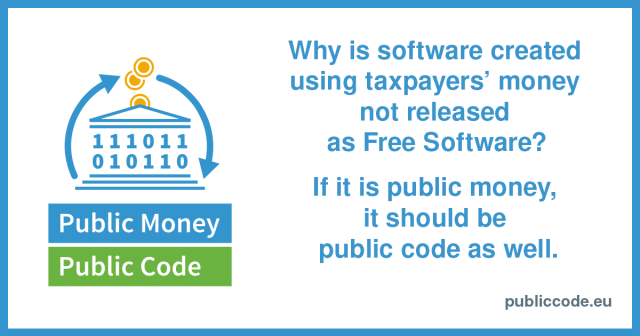
Public Money, Public Code - A campaign for releasing publicly financed software as Free Softwarepubliccode.eu
Next week in Brussels, I'm speaking at Drupal4Gov EU as part of #EUOpenSourceWeek
The #WAD, the #EAA & #Drupal. Now what?
The June 2025 deadline has passed. The risk now is false confidence & operational debt.
10:35am, Jan 29, 2026
#Drupal4Gov #OpenSource #FOSS #Accessibility #EAA
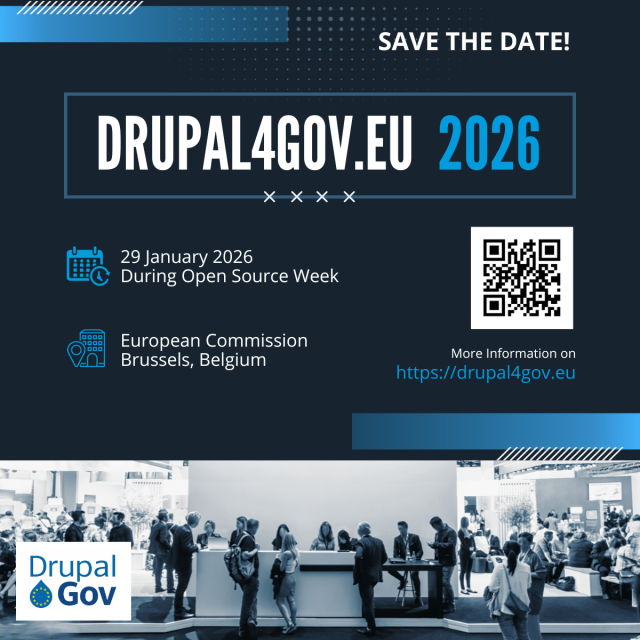
Join us for a day of knowledge sharing and networking in Brusselsdrupal4gov.eu
It's not GNOME, it's not KDE, it's not the new Vanilla OS DE, it's new, uses <100M of memory, is accessible (for real) and uses GTK4 (but not libadwaita).
#Linux #Windows #OpenSource #FOSS
Do you have a map with downloads per capita?
China having a huuuge population, comparing it with Germany or France isn't really relevant of the roots of LibreOffice in each country.
Thanks!
After a good 30 minutes, I've gotten Emacspeak working rather well with mastodon.el. Goodness all those Emoji. For now, n and p read next/prev post well, and t lets you know you're doing new toot. And that's all the making stuff I can do right now.
Dropbox link: dropbox.com/scl/fi/zz4632vjlau…
#Emacs #foss #emacspeak #accessibility #blind
Starting in January 2026, at the beginning of each quarter, i.e. in January, April, July and October, I will publish a slide deck with updated statistics on the LibreOffice project.Italo Vignoli (The Document Foundation)
Okay y'all, first public, alpha, version of Elmud! Basically, the install script should handle everything for you, if you're on Termux for Android, Linux, or Mac. Hopefully. If not, just load-file elmud.el and it'll load emacspeak-elmud.el too. If you need a screen reader, set up and use Emacspeak. For soundpacks, we have one automatically load for Erion MUD and Cosmic Rage. Those are the two I've found easily downloadable. So the client just downloads the sounds for you when you choose those two MUD's. You can also make your own gag or sound triggers. I'll put it up on Github soon but for now:
LibreOffice 26.2 will be released as final at the beginning of February, 2026 (check the Release Plan). LibreOffice 26.2 Release Candidate 2 (RC2) brings us closer to the final version, which will be preceded by Release Candidate 3 (RC3).x1sc0 (QA Community Blog)
🌟 Ready to shape the future of collaboration, all while driving innovation in #opensource? We are hiring! 🌟
Are you a great listener and a curious product person with experience in leadership and engineering? Then you might be a great fit for our Product Tech Lead role at @openproject.
You’ll lead a team of experienced engineers and help shape product direction based on the needs of our users. careers.openproject.org/o/prod…
#productmanagement #productleadership #techleadership #fediHire #foss
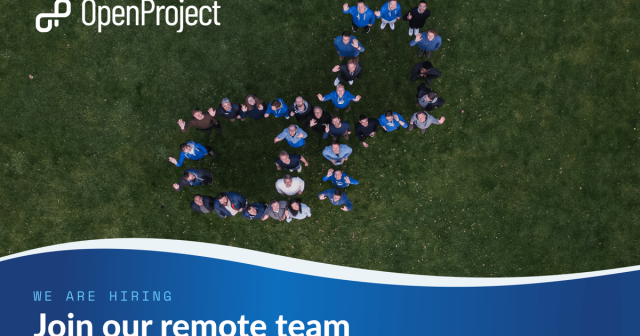
At OpenProject, we build open source project management software that helps teams plan, collaborate, and deliver work more effectively. We believe great software should empower people to organize workOpenProject GmbH
The Document Foundation (TDF) is the non-profit entity behind the LibreOffice project. It collects donations from users, and employs a small team to support and coordinate the worldwide community that makes the software.Mike Saunders (The Document Foundation)
Who has still a #FOSS project hosted on #GitHub? Why?
Don't you prefer a development platform that is aligned with the values of free software?
Did you consider migrating to e.g. @Codeberg? Is there something holding you back?
#opensource #software #git #gitforge #bigtech

Codeberg is a non-profit community-led organization that aims to help free and open source projects prosper by giving them a safe and friendly home.Codeberg.org
I bloggered a post.
It's about shortcomings of FLOSS and a possible next thing.
My Next Project Won't be FLOSS:
pointless.one/my-next-project-…
#FLOSS #FOSS #FreeSoftware #OpenSource #GNU #GPL #OSI #MIT #BSD #BTPL #PolyForm
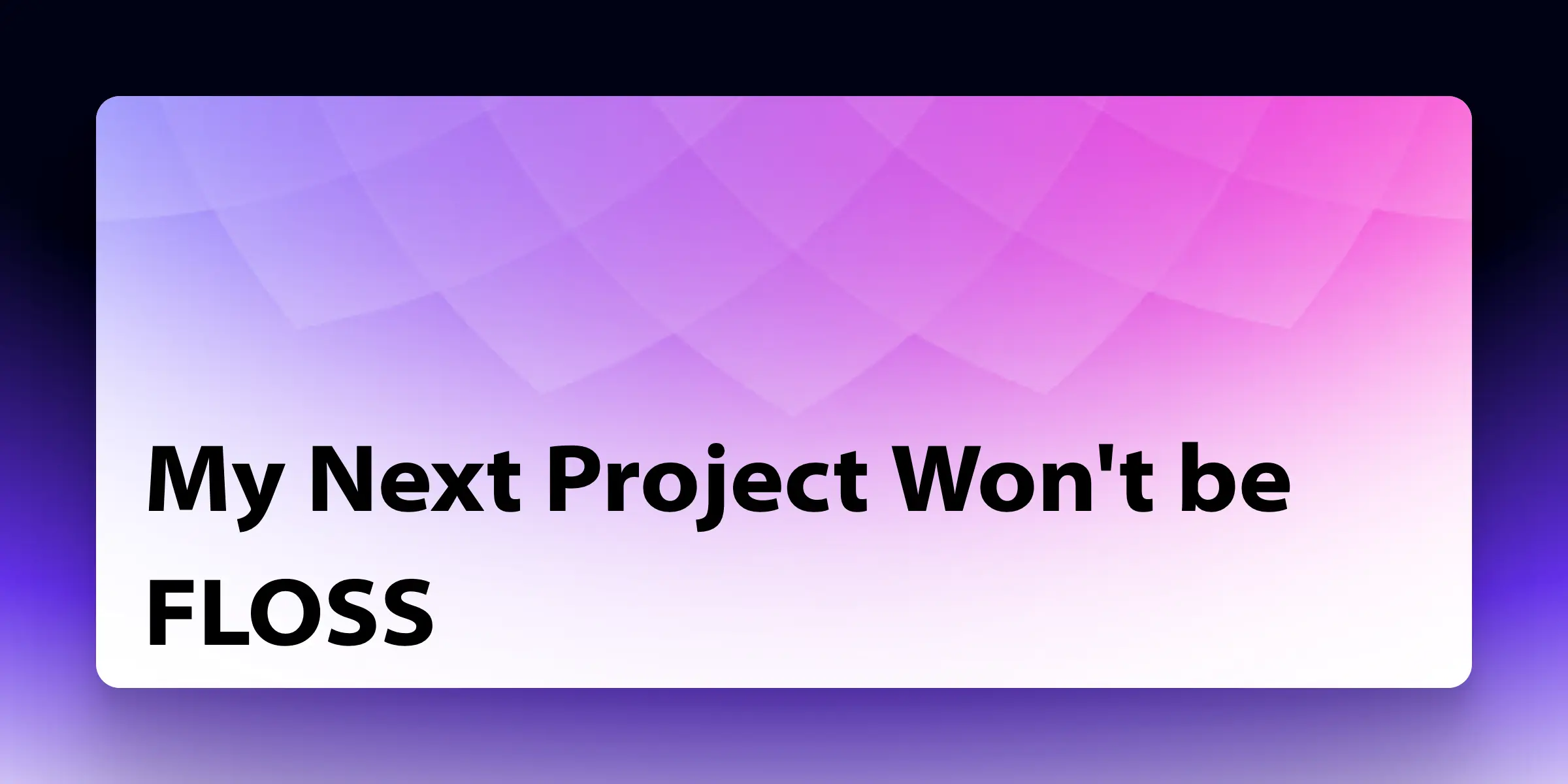
Where FLOSS fails and what to do about it. With a little bit of history.PointlessOne
Whenever I talk to other technology users — including CTOs, CSOs and ICT managers, who in theory should have a certain level of expertise — I realise that most of them never consider standards when using applications, devices or websites.Italo Vignoli (The Document Foundation)
Hello @bagder ,
I wonder if moving to a less crowded code hoster might lower the maintenance burden related to AI crap ?
I am sure you are aware of @Codeberg for example.
At @backintime we also have to deal with low-quality (student) and AI-crap PRs. Moving the project to @Codeberg is one item of my todo list.
For all #foss maintainers I hope we can find a way.
#Camper ist ein gemeinwohlorientiertes Tool zur Organisation und Durchführung von Barcamps - ohne KI.
Gerade wollte ich darauf verweisen und stelle fest, dass die Finanzierung wohl ausgelaufen ist.
Kennt jemand den Stand der Dinge?
Wäre nicht schön, wenn es nicht weiter betrieben und weiter entwickelt würde.
barcamps.eu/
#OpenSource #Barcamp #FOSS #selbstbestimmtDigital
Was having a problem with #openBSD -current where @thunderbird would cause the system to slow down before crashing the UI completely. I would have to SSH in from another box and reboot and this would take a while.
Seems that problem is now fixed. I’ve had Thunderbird running for two days with no issues.
Although - whenever I think I’m out of the woods….
Having said all this I still prefer #foss to being locked in with no privacy and having my data sold and being used to train LLM’s.
Jeff Bezos is saying the quiet part out loud. They want to kill local computing.
You will own nothing and be happy. You will rent your computing power from the cloud. You pay a subscription for the privilege of using a computer.
AI demand is artificially spiking DRAM prices and Big Tech is pushing "AI PCs," the squeeze is on to force us into a rental model.
Reject this future. 
Keep your hardware local.
Run #Linux. 
Own your data.
The "cloud" is just a landlord for your data.
#NoAi #FOSS #OpenSource #Privacy #SelfHost #SelfHosting #BigTech #RightToRepair #RAM #Amazon #EatTheRich
Okay so tonight I have to brag. So with Termux, Emacs, and Emacspeak, there were 2 big problems I still had from when I got AI to rig DecTalk up. First, the tone used for "blank line" and indentation was not working. Second, after a while the Emacspeak sounds would stop working even though DecTalk still was.
So, Claude Code, Opus 4.5, fixed the tone issue, something about sox and Termux specific stuff, and made the Emacspeak sounds thing less of an issue than it was. It still happens, but on first launch without putting Termux in the background and such, it stays alive.
The coolest part, I was using Claude Code inside of Termux on the bus going out to eat. And by the time I got home, it was all fixed!
I've gone through @bce 's product purchase process, including product browsing, configuration, adding to cart, viewing cart, and checkout pages to make sure they are accessible to screen reader users. I've replaced all tables with hierarchical headings, and made sure all inputs are labelled. I'm testing with LibreWolf on Debian with Orca. If any blind users out there could test with their setups and have any feedback, it would be greatly appreciated! Thank you!
Here is the link to the top level products page:
bce.center/products
CC: @jackf723
Note that once this web software is stable, it will be released as FOSS to assist other blind entrepreneurs as well.
#blind #a11y #accessibility #fosh #foss #freehardware #freesoftware
EU calls FOSS experts to come and talk about FOSS for the EU. @sesivany Koho zainteresujeme z ceska?
cadeproject.org/updates/europe…
#eu #foss #opensource #consultation
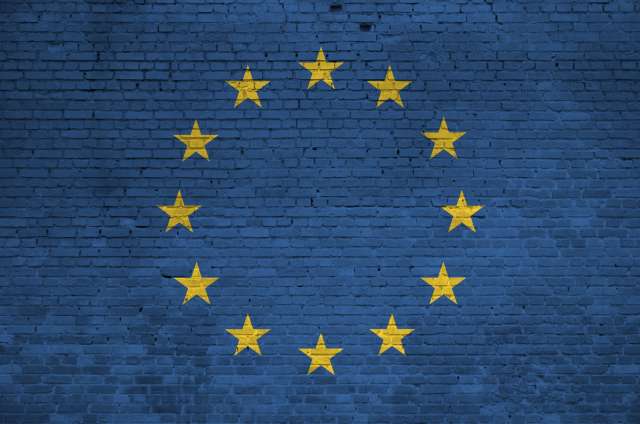
The European Commission has published a call for evidence for an upcoming initiative titled Towards European open digital ecosystems, inviting stakeholders to provide input ahead of a planned Communication to the European Parliament and the Council e…CADE – Civil Society Alliances for Digital Empowerment
Watching someone explain to a FOSS developer that they've never donated to their project "because it's FOSS" and that, unless the developer implements features X, Y, and Z *immediately*, they will continue not to donate in the future.
Yeah, really convincing.
And this is part of why we can't always have nice things.
#FOSS